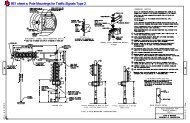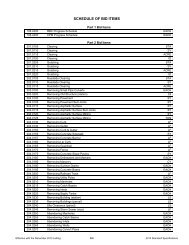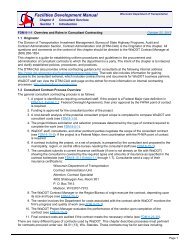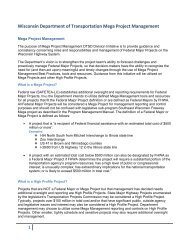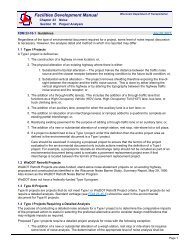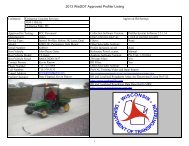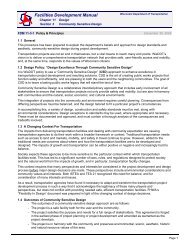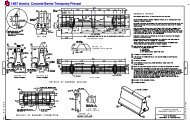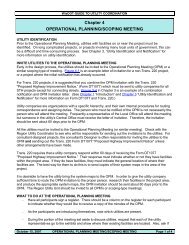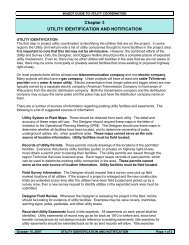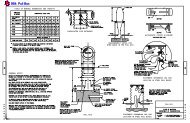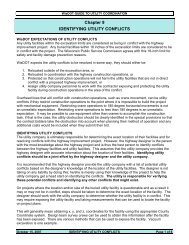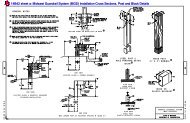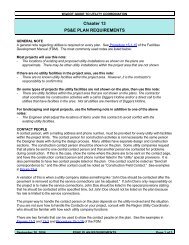Chapter 20 Conflicts During Construction - Wisconsin.gov
Chapter 20 Conflicts During Construction - Wisconsin.gov
Chapter 20 Conflicts During Construction - Wisconsin.gov
Create successful ePaper yourself
Turn your PDF publications into a flip-book with our unique Google optimized e-Paper software.
WisDOT GUIDE TO UTILITY COORDINATION<br />
On connecting highways, every municipality should have a permitting process, but on local road<br />
projects you may find that the local unit of <strong>gov</strong>ernment does not have a utility accommodation policy<br />
and no permitting process. In these cases the local <strong>gov</strong>ernment probably won’t be of much assistance<br />
in solving the problem, but it still doesn’t hurt to try to enlist their support.<br />
CONTRACTOR’S RESPONSIBILITY<br />
Section 107.22 of the State of <strong>Wisconsin</strong> Department of Transportation Standard Specifications<br />
For Highway and Structure <strong>Construction</strong> (<strong>20</strong>05 Edition) states:<br />
107.22 Contractor's Responsibility for Utility Facilities, Property, and Services<br />
(1) The department expressly reserves for the proper authorities of the municipality in which the work is done<br />
the right to construct utility services in the highway or street, or to grant permits for the same, at any time.<br />
Coordinate and cooperate with utilities in the removal and rearrangement of existing facilities to minimize their<br />
service interruption and duplication of work by the utilities. At least 3 business days before breaking ground,<br />
the contractor shall notify the proper utility authorities that the contractor’s operations may affect their facilities<br />
including: streets, gas and water pipes, electric and other conduits, railroads, poles, manholes, catch basins,<br />
sewers, and other property. Never hinder or interfere with utility representatives in the protection or operation<br />
of their facilities. Obtain all necessary information regarding existing facilities. Protect existing facilities from<br />
damage and unnecessary exposure.<br />
(2) Obtain all necessary information regarding the planned installation of new facilities identified in the<br />
contract. Make proper provision and give proper notification so the utilities can install new facilities at the<br />
proper time without delay or unnecessary inconvenience. Do not pave over the location of a new<br />
underground facility, planned for installation concurrently with this contract, before installing the facility.<br />
(3) If the contractor damages or interrupts service, the contractor shall notify the utility promptly. Coordinate<br />
and cooperate with the utility in the repair of the facility. The department will determine who is responsible for<br />
repair costs as specified in <strong>Wisconsin</strong> statutes 66.0831 and 182.0175(2).<br />
(4) If the contractor finds facilities not identified in the contract, the engineer will determine whether<br />
adjustment or relocation of the facility is necessary to accommodate contract work. The engineer will arrange<br />
with the utility or the contractor to adjust or relocate the facility. If deemed necessary, the engineer will revise<br />
the contract as specified in 104.2.<br />
(5) If specified in the contract, the contractor and the department will comply with administrative rule, Trans<br />
2<strong>20</strong> of the <strong>Wisconsin</strong> administrative code.<br />
Please note that the contractor must coordinate and cooperate with utility owners, and it is the<br />
contractor’s responsibility to obtain all necessary information in regard to existing and planned utilities.<br />
FIELD CHANGES<br />
It is sometimes necessary to make changes to the plan during construction. Obviously, the utility had<br />
no way of knowing that these changes were going to take place, and therefore could not relocate prior<br />
to construction. The utility must be notified of such changes, and must be given adequate time to<br />
design and construct a relocation of their facility. The definition of adequate time is open to<br />
interpretation, and varies with the scope of work involved. Trans. 2<strong>20</strong>.05(13) states:<br />
“If, after the letting date of the highway improvement project, additional utility relocation or<br />
adjustment work is found necessary, the department shall notify the owner (utility). The<br />
department and the owner (utility) shall agree on a revised work plan.”<br />
This wording is applicable to all projects, WisDOT and the utility must agree on a reasonable timeframe<br />
to do the relocation work. It is important to note that the field change is the cause of any delays, not the<br />
utility company.<br />
UNKNOWN FACILITIES<br />
This problem has a few potential causes. The facility may not have been field located at the time the<br />
survey crews picked up the topography. The survey crew may have missed it, and not picked up the<br />
September 30, <strong>20</strong>06 CONFLICTS DURING CONSTRUCTION Page 2 of 6



